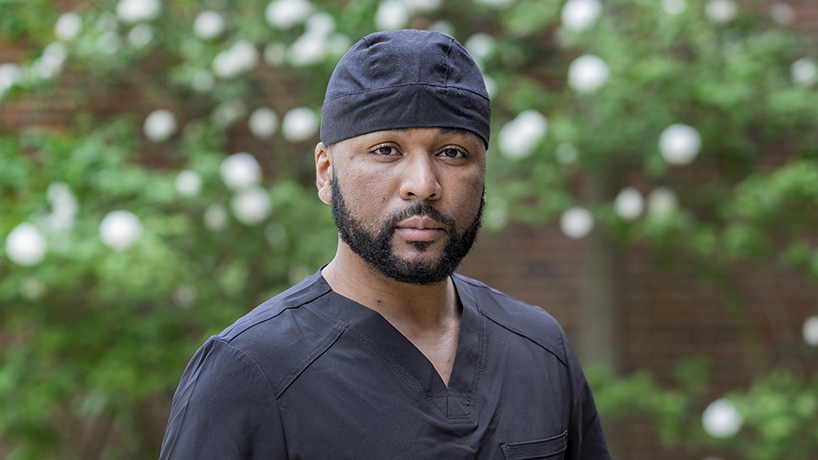
UMSL student Brandon Gilliam has been a broadcast journalist, an educator and an RN. Working through the pandemic, he used the leadership skills developed through his career to help his peers. (Photo by August Jennewein)
Brandon Gilliam had recently finished his associate degree for his registered nurse qualification and joined the cardiac/stepdown telemetry unit at St. Luke’s Hospital in December 2019 when he started hearing about COVID-19.
By the end of January, he’d just taken and passed his state boards when coronavirus exploded into his daily life.
“The world was basically under attack, and it happened so fast,” he said. “One minute, we were you know, at the grocery store. Then, all of a sudden, the pandemic started, and everything had dramatically changed. People started to get sick and get sick fast.
“They’re trying to figure out how to protect the world, how to protect the staff, the nurses, the doctors, how to treat the patients. There were complete overhauls of the hospital structure, like how things were typically supposed to be run.”
Gilliam had just begun the RN to BSN Program at the University of Missouri–St. Louis, and like the rest of the world, found himself forced to adapt quickly.
Many of his classmates were brand new nurses, and Gilliam drew on his experience on the floor as a licensed practical nurse to help his peers through a stressful experience. A little more than a year later, Gilliam is now poised to graduate from the College of Nursing and take the leadership skills honed during a pandemic and throughout his nursing education to life post-academia.
“Nurses are leaders,” he said. “You have to be a leader to some extent. There’s so much you have to know as a nurse, so we basically control a lot of what happens with the patient and the flow of the units. We are the eyes and ears of the doctors.”
Nursing is Gilliam’s third profession, and he brings skills and experience gained from them to his nursing career.
He graduated in 2007 from Lincoln University with a degree in broadcast journalism and worked briefly in the field before – feeling stymied by the lack of job prospects – he left for education.
While in school, he’d worked at the Freedom School, a reading summer program. That led him to apply for a Provisional Teaching Certificate, which allowed Gilliam to work first as an applied behavior analyst working with children on the autism spectrum and then as a middle school teacher.
“Teaching was very rewarding,” Gilliam said. “As you get older, you start to want to buckle down a lot more. I didn’t really have a sense of the future. I felt that nursing had way more opportunities for me. I felt that if I went back to school and got my nursing degree that I wouldn’t feel so restricted. I can do so many things with this degree, and it’s fun to me. It’s very stressful. But it’s fun, and it’s rewarding.”
Gilliam’s mother is a nurse, and he’d briefly had it as his major in college, so the profession had been at the back of his mind for a while. He’d transferred to UMSL after completing his associate degree in part because he’s had friends have had good experiences at the university.
“I had a great experience with UMSL,” he said. “The premise of becoming a BSN is expounding on your nursing talent on the floor, taking it into the classroom or a leadership role. This program focuses on community relations, which was a huge thing for me. I got to talk a lot about volunteerism, philanthropy, giving back to the community.”
A member of the Kappa Alpha Psi fraternity, Gilliam has volunteered extensively. He’s worked with scholarship drives, an annual 5k for the St. Jude Children’s Research Hospital, highway cleanup and drives to provide school supplies.
He sees his passion for volunteerism as connected to his decision to pursue nursing.
“You can’t just do this for the money,” Gilliam said. “You have to have a certain respect for humanity. You have an attitude of service. A servant to the community in order to be an effective nurse. The optimism behind helping others drives the passion I have for this career.”
“The hours might feel like work, but the actual work that you’re doing, that’s something I would do if I were getting paid, or not getting paid, taking care of people, making sure that they are OK. I guess it all correlates.”
Throughout his educational journey, Gilliam has juggled full-time school with full-time work at the hospital and a part-time job at Maxim Healthcare conducting corporate wellness events.
Balancing it all has been a challenge, but the trick, Gilliam says, is to stay organized and ignore the distractions.
Eventually, he can see himself returning to school for a graduate degree to become a nurse practitioner. But first he’s looking forward to having some free time after graduation in May.
“I learned so much,” he said. “I had a great experience with my instructors. I love what I do. I have a passion for it. I always like to try to encourage people to follow their dreams.”














